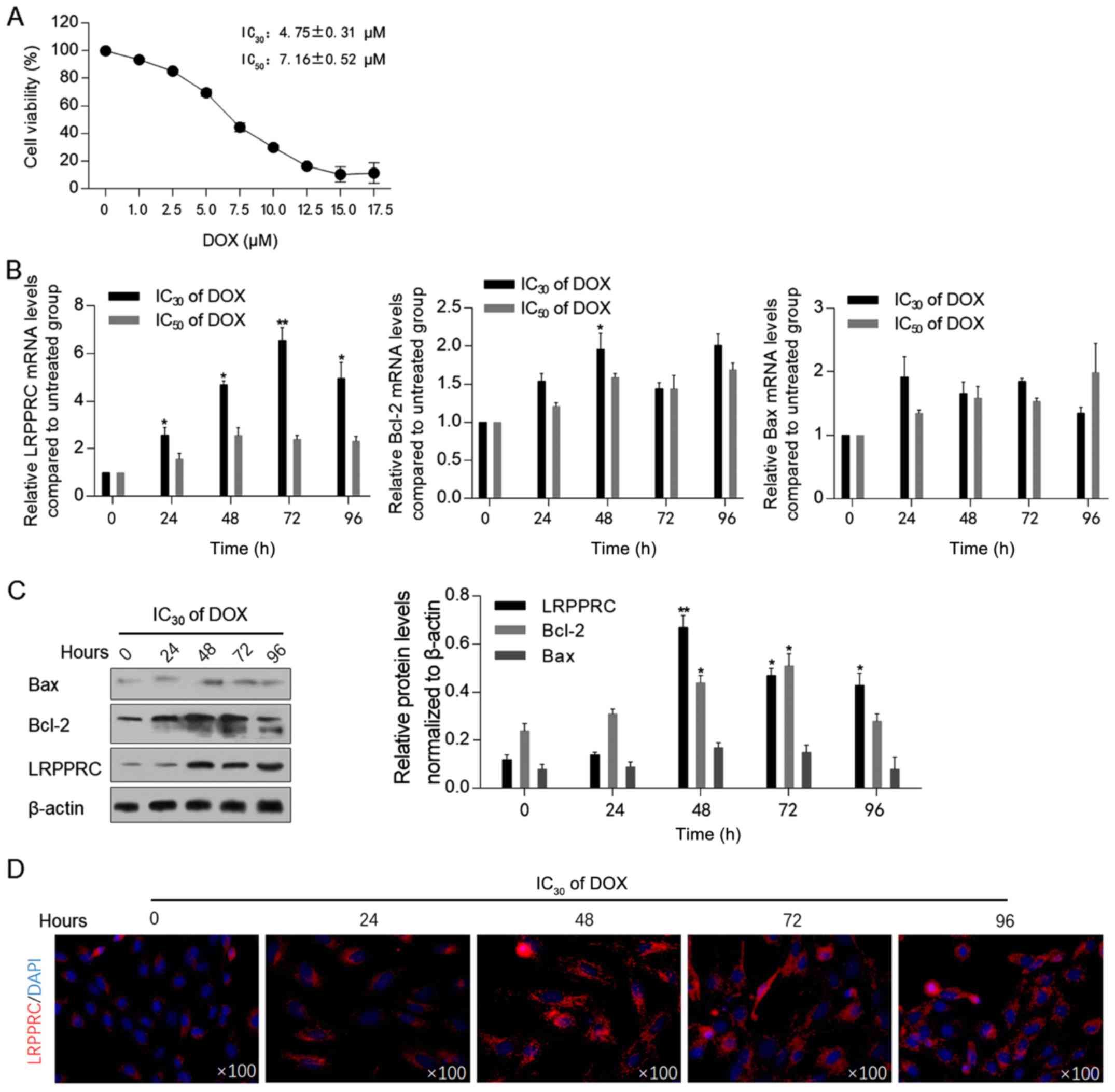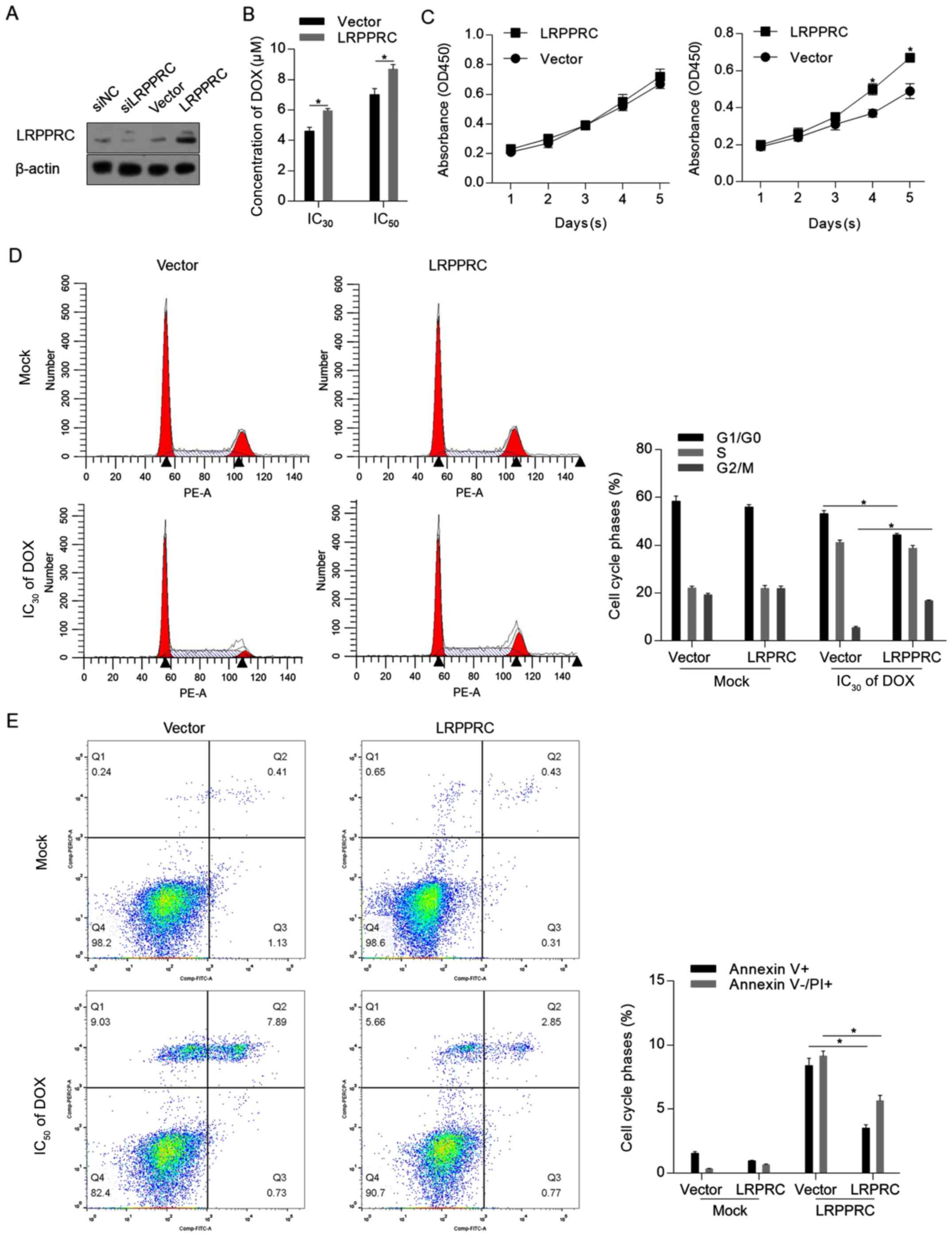|
1
|
Menna P, Salvatorelli E and Minotti G:
Doxorubicin degradation in cardiomyocytes. J Pharmacol Exp Ther.
322:408–419. 2007.PubMed/NCBI View Article : Google Scholar
|
|
2
|
Umansky SR, Shapiro JP, Cuenco GM, Foehr
MW, Bathurst IC and Tomei LD: Prevention of rat neonatal
cardiomyocyte apoptosis induced by simulated in vitro ischemia and
reperfusion. Cell Death Differ. 4:608–616. 1997.PubMed/NCBI View Article : Google Scholar
|
|
3
|
Olson HM, Young DM, Prieur DJ, LeRoy AF
and Reagan RL: Electrolyte and morphologic alterations of
myocardium in adriamycin-treated rabbits. Am J Pathol. 77:439–454.
1974.PubMed/NCBI
|
|
4
|
Myers CE, Gianni L, Simone CB, Klecker R
and Greene R: Oxidative destruction of erythrocyte ghost membranes
catalyzed by the doxorubicin-iron complex. Biochemistry.
21:1707–1712. 1982.PubMed/NCBI View Article : Google Scholar
|
|
5
|
Olson RD and Mushlin PS: Doxorubicin
cardiotoxicity: Analysis of prevailing hypotheses. FASEB J.
4:3076–3086. 1990.PubMed/NCBI
|
|
6
|
Piasek A, Bartoszek A and Namiesnik J:
Phytochemicals that counteract the cardiotoxic side effects of
cancer chemotherapy. Postepy Hig Med Dosw (Online). 63:142–158.
2009.PubMed/NCBI(In Polish).
|
|
7
|
Sasarman F, Brunel-Guitton C, Antonicka H,
Wai T and Shoubridge EA: LSFC Consortium. LRPPRC and SLIRP interact
in a ribonucleoprotein complex that regulates posttranscriptional
gene expression in mitochondria. Mol Biol Cell. 21:1315–1323.
2010.PubMed/NCBI View Article : Google Scholar
|
|
8
|
Ruzzenente B, Metodiev MD, Wredenberg A,
Bratic A, Park CB, Cámara Y, Milenkovic D, Zickermann V, Wibom R,
Hultenby K, et al: LRPPRC is necessary for polyadenylation and
coordination of translation of mitochondrial mRNAs. EMBO J.
31:443–456. 2012.PubMed/NCBI View Article : Google Scholar
|
|
9
|
Chujo T, Ohira T, Sakaguchi Y, Goshima N,
Nomura N, Nagao A and Suzuki T: LRPPRC/SLIRP suppresses
PNPase-mediated mRNA decay and promotes polyadenylation in human
mitochondria. Nucleic Acids Res. 40:8033–8047. 2012.PubMed/NCBI View Article : Google Scholar
|
|
10
|
Xu F, Morin C, Mitchell G, Ackerley C and
Robinson BH: The role of the LRPPRC (leucine-rich pentatricopeptide
repeat cassette) gene in cytochrome oxidase assembly: Mutation
causes lowered levels of COX (cytochrome c oxidase) I and COX III
mRNA. Biochem J. 382:331–336. 2004.PubMed/NCBI View Article : Google Scholar
|
|
11
|
Mili S and Pinol-Roma S: LRP130, a
pentatricopeptide motif protein with a noncanonical RNA-binding
domain, is bound in vivo to mitochondrial and nuclear RNAs. Mol
Cell Biol. 23:4972–4982. 2003.PubMed/NCBI View Article : Google Scholar
|
|
12
|
Topisirovic I, Siddiqui N, Orolicki S,
Skrabanek LA, Tremblay M, Hoang T and Borden KLB: Stability of
eukaryotic translation initiation factor 4E mRNA is regulated by
HuR, and this activity is dysregulated in cancer. Mol Cell Biol.
29:1152–1162. 2009.PubMed/NCBI View Article : Google Scholar
|
|
13
|
Sterky FH, Ruzzenente B, Gustafsson CM,
Samuelsson T and Larsson NG: LRPPRC is a mitochondrial matrix
protein that is conserved in metazoans. Biochem Biophys Res Commun.
398:759–764. 2010.PubMed/NCBI View Article : Google Scholar
|
|
14
|
Wang S, Wang Y, Zhang Z, Liu Q and Gu J:
Cardioprotective effects of fibroblast growth factor 21 against
doxorubicin-induced toxicity via the SIRT1/LKB1/AMPK pathway. Cell
Death Dis. 8(e3018)2017.PubMed/NCBI View Article : Google Scholar
|
|
15
|
Liu D, Ma Z, Xu L, Zhang X, Qiao S and
Yuan J: PGC1α activation by pterostilbene ameliorates acute
doxorubicin cardiotoxicity by reducing oxidative stress via
enhancing AMPK and SIRT1 cascades. Aging (Albany NY).
11:10061–10073. 2019.PubMed/NCBI View Article : Google Scholar
|
|
16
|
Wen J, Zhang L, Liu H, Wang J, Li J, Yang
Y, Wang Y, Cai H, Li R and Zhao Y: Salsolinol attenuates
doxorubicin-induced chronic heart failure in rats and improves
mitochondrial function in H9c2 cardiomyocytes. Front Pharmacol.
10(1135)2019.PubMed/NCBI View Article : Google Scholar
|
|
17
|
Livak KJ and Schmittgen TD: Analysis of
relative gene expression data using real-time quantitative PCR and
the 2(-Delta Delta C(T)) method. Methods. 25:402–408.
2001.PubMed/NCBI View Article : Google Scholar
|
|
18
|
Errami M, Galindo CL, Tassa AT, Dimaio JM,
Hill JA and Garner HR: Doxycycline attenuates isoproterenol- and
transverse aortic banding-induced cardiac hypertrophy in mice. J
Pharmacol Exp Ther. 324:1196–1203. 2008.PubMed/NCBI View Article : Google Scholar
|
|
19
|
Hori Y, Kunihiro S, Sato S, Yoshioka K,
Hara Y, Kanai K, Hoshi F, Itoh N and Higuchi S: Doxycycline
attenuates isoproterenol-induced myocardial fibrosis and matrix
metalloproteinase activity in rats. Biol Pharm Bull. 32:1678–1682.
2009.PubMed/NCBI View Article : Google Scholar
|
|
20
|
Mourier A, Ruzzenente B, Brandt T,
Kühlbrandt W and Larsson NG: Loss of LRPPRC causes ATP synthase
deficiency. Hum Mol Genet. 23:2580–2592. 2014.PubMed/NCBI View Article : Google Scholar
|
|
21
|
Cuillerier A, Honarmand S, Cadete V, Ruiz
M, Forest A, Deschênes S, Beauchamp C, LSFC Consortium; Charron G,
Rioux JD, et al: Loss of hepatic LRPPRC alters mitochondrial
bioenergetics, regulation of permeability transition and
trans-membrane ROS diffusion. Hum Mol Genet. 26:3186–3201.
2017.PubMed/NCBI View Article : Google Scholar
|
|
22
|
Sack MN, Fyhrquist FY, Saijonmaa OJ,
Fuster V and Kovacic JC: Basic biology of oxidative stress and the
cardiovascular system: Part 1 of a 3-part series. J Am Coll
Cardiol. 70:196–211. 2017.PubMed/NCBI View Article : Google Scholar
|
|
23
|
Liu D, Ma Z, Di S, Yang Y, Yang J, Xu L,
Reiter RJ, Qiao S and Yuan J: AMPK/PGC1a activation by melatonin
attenuates acute doxorubicin cardiotoxicity via alleviating
mitochondrial oxidative damage and apoptosis. Free Radic Biol Med.
129:59–72. 2018.PubMed/NCBI View Article : Google Scholar
|
|
24
|
Ma Z, Xin Z, Di W, Yan X, Li X, Reiter RJ
and Yang Y: Melatonin and mitochondrial function during
ischemia/reperfusion injury. Cell Mol Life Sci. 74:3989–3998.
2017.PubMed/NCBI View Article : Google Scholar
|
|
25
|
Galley HF, McCormick B, Wilson KL, Lowes
DA, Colvin L and Torsney C: Melatonin limits paclitaxel-induced
mitochondrial dysfunction in vitro and protects against
paclitaxel-induced neuropathic pain in the rat. J Pineal Res.
63(e12444)2017.PubMed/NCBI View Article : Google Scholar
|
|
26
|
Takemura G and Fujiwara H:
Doxorubicin-induced cardiomyopathy from the cardiotoxic mechanisms
to management. Prog Cardiovasc Dis. 49:330–352. 2007.PubMed/NCBI View Article : Google Scholar
|
|
27
|
Octavia Y, Tocchetti CG, Gabrielson KL,
Janssens S, Crijns HJ and Moens AL: Doxorubicin-induced
cardiomyopathy: From molecular mechanisms to therapeutic
strategies. J Mol Cell Cardiol. 52:1213–1225. 2012.PubMed/NCBI View Article : Google Scholar
|


















